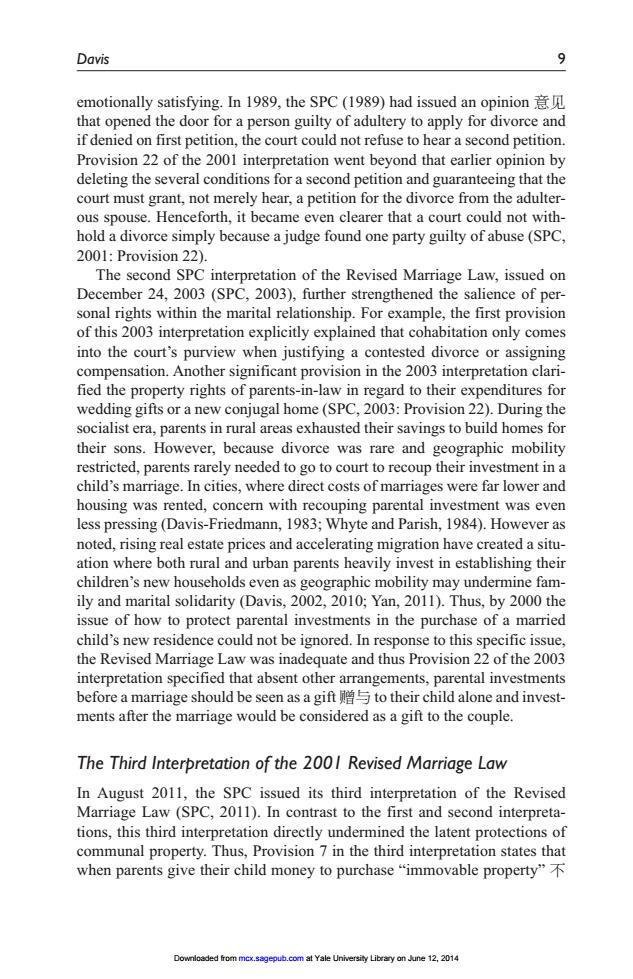正在加载图片...

Davis 9 emotionally satisfying.In 1989,the SPC(1989)had issued an opinion that opened the door for a person guilty of adultery to apply for divorce and if denied on first petition,the court could not refuse to hear a second petition. Provision 22 of the 2001 interpretation went beyond that earlier opinion by deleting the several conditions for a second petition and guaranteeing that the court must grant,not merely hear,a petition for the divorce from the adulter- ous spouse.Henceforth,it became even clearer that a court could not with- hold a divorce simply because a judge found one party guilty of abuse(SPC, 2001:Provision 22). The second SPC interpretation of the Revised Marriage Law,issued on December 24,2003(SPC,2003),further strengthened the salience of per- sonal rights within the marital relationship.For example,the first provision of this 2003 interpretation explicitly explained that cohabitation only comes into the court's purview when justifying a contested divorce or assigning compensation.Another significant provision in the 2003 interpretation clari- fied the property rights of parents-in-law in regard to their expenditures for wedding gifts or a new conjugal home(SPC,2003:Provision 22).During the socialist era,parents in rural areas exhausted their savings to build homes for their sons.However,because divorce was rare and geographic mobility restricted,parents rarely needed to go to court to recoup their investment in a child's marriage.In cities,where direct costs of marriages were far lower and housing was rented,concern with recouping parental investment was even less pressing(Davis-Friedmann,1983;Whyte and Parish,1984).However as noted,rising real estate prices and accelerating migration have created a situ- ation where both rural and urban parents heavily invest in establishing their children's new households even as geographic mobility may undermine fam- ily and marital solidarity (Davis,2002,2010;Yan,2011).Thus,by 2000 the issue of how to protect parental investments in the purchase of a married child's new residence could not be ignored.In response to this specific issue, the Revised Marriage Law was inadequate and thus Provision 22 of the 2003 interpretation specified that absent other arrangements,parental investments before a marriage should be seen as a gift to their child alone and invest- ments after the marriage would be considered as a gift to the couple. The Third Interpretation of the 2001 Revised Marriage Law In August 2011,the SPC issued its third interpretation of the Revised Marriage Law (SPC,2011).In contrast to the first and second interpreta- tions,this third interpretation directly undermined the latent protections of communal property.Thus,Provision 7 in the third interpretation states that when parents give their child money to purchase"immovable property" Downloaded from mcx.sagepub.com at Yale University Library on June 12,2014Davis 9 emotionally satisfying. In 1989, the SPC (1989) had issued an opinion 意见 that opened the door for a person guilty of adultery to apply for divorce and if denied on first petition, the court could not refuse to hear a second petition. Provision 22 of the 2001 interpretation went beyond that earlier opinion by deleting the several conditions for a second petition and guaranteeing that the court must grant, not merely hear, a petition for the divorce from the adulterous spouse. Henceforth, it became even clearer that a court could not withhold a divorce simply because a judge found one party guilty of abuse (SPC, 2001: Provision 22). The second SPC interpretation of the Revised Marriage Law, issued on December 24, 2003 (SPC, 2003), further strengthened the salience of personal rights within the marital relationship. For example, the first provision of this 2003 interpretation explicitly explained that cohabitation only comes into the court’s purview when justifying a contested divorce or assigning compensation. Another significant provision in the 2003 interpretation clarified the property rights of parents-in-law in regard to their expenditures for wedding gifts or a new conjugal home (SPC, 2003: Provision 22). During the socialist era, parents in rural areas exhausted their savings to build homes for their sons. However, because divorce was rare and geographic mobility restricted, parents rarely needed to go to court to recoup their investment in a child’s marriage. In cities, where direct costs of marriages were far lower and housing was rented, concern with recouping parental investment was even less pressing (Davis-Friedmann, 1983; Whyte and Parish, 1984). However as noted, rising real estate prices and accelerating migration have created a situation where both rural and urban parents heavily invest in establishing their children’s new households even as geographic mobility may undermine family and marital solidarity (Davis, 2002, 2010; Yan, 2011). Thus, by 2000 the issue of how to protect parental investments in the purchase of a married child’s new residence could not be ignored. In response to this specific issue, the Revised Marriage Law was inadequate and thus Provision 22 of the 2003 interpretation specified that absent other arrangements, parental investments before a marriage should be seen as a gift 赠与 to their child alone and investments after the marriage would be considered as a gift to the couple. The Third Interpretation of the 2001 Revised Marriage Law In August 2011, the SPC issued its third interpretation of the Revised Marriage Law (SPC, 2011). In contrast to the first and second interpretations, this third interpretation directly undermined the latent protections of communal property. Thus, Provision 7 in the third interpretation states that when parents give their child money to purchase “immovable property” 不 Downloaded from mcx.sagepub.com at Yale University Library on June 12, 2014